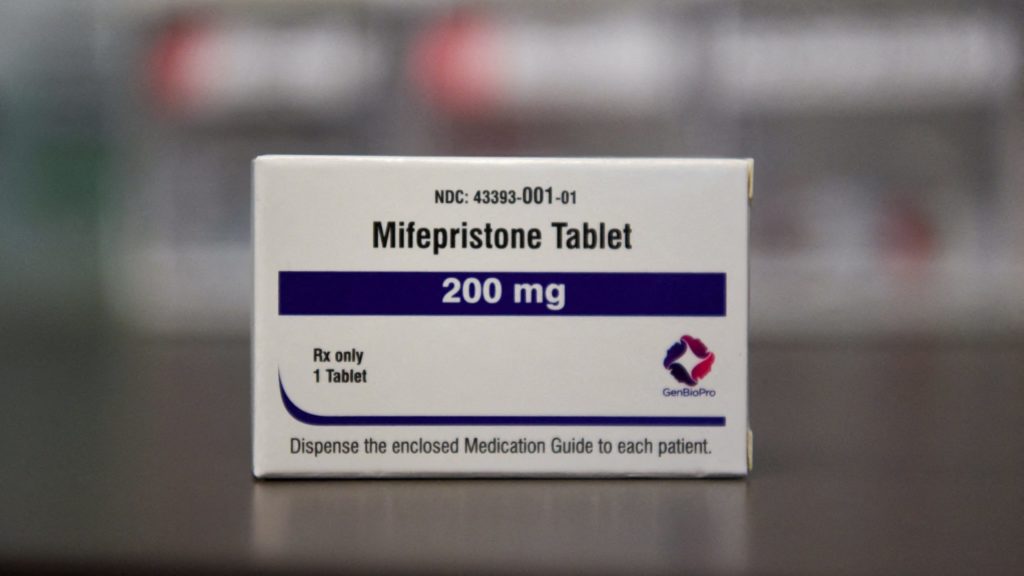The U.S. Supreme Court said it would extend the administrative stay in the abortion pill dispute until April 21, temporarily keeping in place status quo federal regulations regarding the use of an abortion drug, and giving the court additional time to consider a lower court's ruling to stay the U.S. Food and Drug Administration's approval of the drug.
The court extended by two days its own deadline, initially set for April 19. The Justice Department and the pharmaceutical company behind the abortion pill had asked the U.S. Supreme Court earlier in the day to intervene in the case.
An original order signed by Justice Samuel Alito stayed U.S. District Judge Matthew Kacsmaryk's previous ruling in the case until April 19.
A federal appeals court on April 12 froze portions of Kacsmaryk's ruling suspending the FDA's approval of a medication abortion pill, ruling that the drug can remain on the market but under more strict regulations while amid a legal challenge to that approval.
"The district court countermanded a scientific judgment FDA has maintained across five administrations; nullified the approval of a drug that has been safely used by millions of Americans over more than two decades; and upset reliance interests in a healthcare system that depends on the availability of mifepristone as an alternative to surgical abortion for women who choose to lawfully terminate their early pregnancies," the Justice Department wrote in its filing seeking relief from the high court.
The Justice Department and Danco Laboratories, the manufacturer of mifepristone, asked the high court to put the appeals ruling on hold for the ongoing case.
A coalition of pro-life opponents of the abortion-causing drug mifepristone, the first of two drugs used in a medication or chemical abortion, is seeking the FDA's approval of the drug be revoked on the basis that the federal agency violated its own safety standard in approving mifepristone more than two decades ago. However, proponents countered mifepristone poses objectively little risk to women using it for abortion early in pregnancy, and claim the drug is being singled out for political reasons.
A three-judge panel of the 5th U.S. Circuit Court of Appeals agreed April 12 to temporarily block Kacsmaryk's Good Friday ruling that suspended the FDA's approval of mifepristone.
However, the appeals court in its 2-1 decision also permitted other portions of that ruling to take effect, rolling back FDA rules revised in 2016 and 2021 on a drug the agency originally approved in 2000. Those rules permitted mifepristone's usage up to 10 weeks of pregnancy rather than the original seven weeks, and permitted its distribution by mail.
The Supreme Court's April 14 intervention keeps the most recent FDA rules in place for now.
Earlier in the day, Bishop Michael F. Burbidge of Arlington, chairman of the U.S. Conference of Catholic Bishops' Committee on Pro-Life Activities, welcomed the appeals court's ruling in a statement, saying it "was right to recognize the dangers of unrestricted chemical abortion to women's health and safety."
"We are grateful for the restoration of protections, and any limitation on the use of these lethal drugs," Bishop Burbidge said. "We hope that the final ruling will result in removal of chemical abortion from the market altogether. Abortion is never the right choice for a difficult or unexpected pregnancy, as it always ends one life and risks another. We pray ardently that our nation will authentically support and accompany women, so that ending the lives of their children alone in their own homes will be unthinkable."
The Catholic Church teaches human life is sacred and must be respected from conception to natural death and, as such, opposes direct abortion as an act of violence that ends the life of the unborn child. After the Supreme Court reversed its previous abortion precedent last year, the U.S. bishops have reiterated the church's commitment to serving both women and unborn children.

